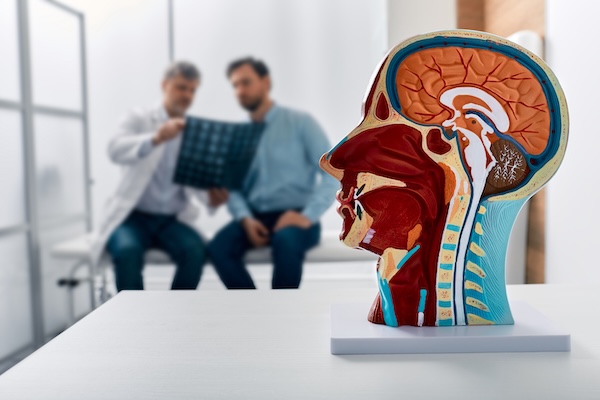Understanding Neurological Injuries and Their Impact
Neurological injuries can have a profound impact on a person’s daily life, affecting everything from muscle movement and cognitive functions to sensory perception and overall brain function. Whether caused by a traumatic brain injury, stroke, or spinal cord injuries, these conditions can lead to neurological symptoms such as loss of balance, slurred speech, skin tingling, and paralysis.
In Atlanta Neurology, individuals experiencing neurological damage symptoms often require prompt medical attention to prevent further complications. Since symptoms vary depending on the affected area of the brain and spinal cord, an accurate diagnosis is essential to determine the most effective treatment approaches for managing neurological problems.
At Georgia Spine & Orthopaedics, we provide comprehensive care for patients dealing with neurological disorders and nerve disorders caused by traumatic injury, environmental factors, or underlying medical conditions. Some of the most common symptoms associated with neurologic disorders include headache, double vision, cognitive impairment, sleep problems, and difficulty controlling muscle movement.
Whether the issue stems from brain tissue damage, blood flow disruption, or nerve cell degeneration, understanding the risk factors and seeking specialized care can help individuals manage symptoms and improve their quality of life. With advancements in CT scans, clinical trials, and physical therapy, patients now have access to more effective treatments tailored to their specific neurological condition.
Understanding Neurological Disorders
Neurological disorders encompass a wide range of conditions that affect the brain, spinal cord, and peripheral nervous system, often leading to significant disruptions in cognitive functions, muscle movement, and sensory perception.
These disorders can arise from various causes, including traumatic brain injury, stroke, nerve damage, genetic factors, infections, autoimmune diseases, and environmental factors. In many cases, the exact cause of a neurological condition is difficult to determine, but early recognition of neurological symptoms is essential for an accurate diagnosis and timely intervention.
Some of the most common symptoms associated with neurologic disorders include headaches, slurred speech, loss of balance, paralysis, double vision, chronic pain, and sleep problems.
Disruptions to the central nervous system and peripheral nervous system can lead to progressive conditions such as Alzheimer’s disease, multiple sclerosis, and functional neurologic disorder, as well as acute conditions like spinal cord injuries and stroke. Since symptoms may vary depending on the severity and location of the injury, diagnostic tools such as CT scans, MRI scans, and neurological exams play a crucial role in identifying the underlying issue.
Additionally, some neurological conditions can be linked to blood vessel damage, impaired blood flow, or deterioration of brain cells, further impacting overall brain function. Treatment for these disorders often involves a combination of physical therapy, prescription medications, and other treatment approaches aimed at helping patients manage symptoms and maintain their quality of life.
Common Neurological Damage Symptoms
Neurological disorders can manifest in a variety of ways, often impacting multiple functions of the brain, spinal cord, and nervous system. Because the symptoms vary depending on the type and severity of the condition, recognizing early warning signs is crucial for obtaining an accurate diagnosis and pursuing effective treatment approaches.
Some individuals may experience gradual onset symptoms, while others may develop neurological problems suddenly due to a traumatic brain injury, stroke, or spinal cord damage. Below are some of the most common symptoms associated with neurologic disorders:
- Difficulty with memory, concentration, and cognitive function – Many neurological conditions, including Alzheimer’s disease and multiple sclerosis, affect brain function, leading to problems with cognitive functions such as memory retention, problem-solving, and decision-making.
- Muscle weakness, numbness, or paralysis – Damage to the brain, spinal cord, or peripheral nervous system can disrupt signals between the nerves and muscles, resulting in muscle movement issues, weakness, or even paralysis.
- Seizures, tremors, or muscle spasms – Some nerve disorders and neurological disorders, such as functional neurologic disorder and stroke, can lead to involuntary movements, including tremors, seizures, or muscle spasms that affect daily activities.
- Vision problems, including blurred vision, double vision, or loss of vision – Issues affecting the central nervous system may cause double vision, blurred vision, or even vision loss, making it difficult to perform routine tasks.
- Headaches, migraines, or chronic pain – Persistent headaches or migraines can indicate underlying neurological damage, especially if accompanied by other neurological symptoms such as slurred speech, dizziness, or loss of consciousness.
- Sleep disturbances, including insomnia or hypersomnia – Many neurological disorders can interfere with sleep patterns, causing insomnia, hypersomnia, or other sleep problems, which in turn may worsen mental disorders and other neurological conditions.
If you experience any neurological damage symptoms, seeking prompt medical attention is essential for identifying the underlying cause and exploring comprehensive care options to help manage symptoms and improve overall well-being.
Types of Neurological Disorders
Neurological disorders can arise from various causes, including traumatic injury, degenerative diseases, and functional impairments of the nervous system. These conditions affect the brain, spinal cord, and peripheral nervous system, often leading to significant challenges in cognitive functions, muscle movement, and sensory perception. Below are some of the most prevalent types of neurological disorders and their associated neurological damage symptoms.
Traumatic Brain Injuries
A traumatic brain injury (TBI) typically results from a violent blow or jolt to the head or body, often occurring in contact sports, car accidents, or falls. These injuries can range from mild to severe, affecting brain function in different ways.
A mild TBI, commonly known as a concussion, may cause temporary dysfunction of brain cells, while more severe cases can lead to physical damage to brain tissue. Symptoms may include loss of consciousness, confusion, difficulty with memory and concentration, persistent headaches, and slurred speech. In such cases, immediate medical attention is critical to minimize long-term complications.
Functional Neurologic Disorders
Functional neurologic disorders affect the nervous system’s ability to control muscle movement and sensory processing without causing structural damage to the brain or spinal cord. These conditions are complex and often linked to mental disorders or psychological stress, rather than physical injury.
Examples include conversion disorder, somatic symptom disorder, and factitious disorder, all of which can present with a wide range of neurological symptoms. Symptoms may include numbness, weakness, paralysis, seizures, tremors, and difficulty walking, making daily activities challenging.
While the exact cause remains unclear, treatment often involves a combination of physical therapy, psychotherapy, and other treatment approaches to help patients regain function.
Degenerative Brain Diseases
Degenerative brain diseases are progressive conditions that cause gradual deterioration of the brain and nervous system, often leading to irreversible neurological damage. These disorders affect brain cells, nerve function, and blood flow, resulting in worsening symptoms over time.
Common examples include Alzheimer’s disease, Parkinson’s disease, and multiple sclerosis, all of which have a significant impact on both cognitive functions and physical movement. Symptoms may include memory loss, difficulty with movement, vision problems, muscle weakness, and speech difficulties.
While these conditions have no known cure, prescription medications, physical therapy, and clinical trials are often used to help manage symptoms and slow disease progression.
Each of these neurological disorders presents unique challenges, requiring a specialized approach to diagnosis, treatment, and long-term management. If you or a loved one is experiencing neurological symptoms, seeking comprehensive care from a healthcare provider can help improve quality of life and prevent further complications.
Recognizing Symptoms of Specific Neurological Disorders
Different neurological disorders affect the brain, spinal cord, and peripheral nervous system in unique ways, leading to distinct neurological symptoms. Recognizing the specific signs of each condition can help with early detection and ensure appropriate treatment approaches. Below are some common types of neurological conditions and their key symptoms.
Nerve Disorders
Nerve disorders, such as carpal tunnel syndrome, occur when nerve cells become compressed, damaged, or irritated, leading to problems with muscle movement and sensation. These conditions can cause numbness, weakness, or even paralysis in the affected area.
Symptoms may include:
- Tingling, burning, or pain in the hands, feet, or other affected areas
- Muscle weakness or loss of grip strength
- Skin tingling or sensitivity to touch
An accurate diagnosis is essential to prevent long-term neurological damage. Treatments such as physical therapy, prescription medications, and nerve decompression procedures can help manage symptoms and restore function.
Brain Injuries
Brain injuries, including traumatic brain injuries (TBI), can lead to a wide range of neurological problems depending on the severity of the brain tissue damage. Symptoms may develop immediately after an injury or emerge over time, making early medical attention critical.
Symptoms may include:
- Loss of consciousness, confusion, or difficulty with memory and concentration
- Vision problems, including blurred or double vision
- Headaches, dizziness, and persistent sleep problems
Rehabilitation, including physical therapy, cognitive therapy, and comprehensive care, plays a vital role in recovery. In severe cases, long-term treatment may be needed to help patients manage symptoms and regain lost brain function.
Recognizing these neurological conditions early can make a significant difference in treatment outcomes. If you experience symptoms of a nerve disorder or brain injury, seeking immediate evaluation from a healthcare provider can help prevent complications and improve overall well-being.
Diagnosing Neurological Disorders
Proper diagnosis of neurological disorders is essential for determining the right treatment approaches and helping patients manage symptoms effectively. Since neurological problems can stem from a variety of causes—including brain injuries, spinal cord disorders, and nerve conditions—a comprehensive evaluation is necessary to identify the root of the issue. Diagnosis typically involves a combination of medical history review, physical examination, and advanced diagnostic tests.
Medical History and Physical Exam
A thorough medical history and physical exam are the first steps in diagnosing neurological conditions. During the evaluation, a healthcare provider will ask detailed questions about neurological symptoms, past medical conditions, family history, and lifestyle habits that may contribute to neurological damage.
The physical exam helps assess:
- Muscle strength and ability to control muscle movement
- Reflexes and nerve function
- Coordination, balance, and overall brain function
This initial assessment provides important clues about potential nerve disorders, brain injuries, or spinal cord issues, guiding further testing.
Diagnostic Tests
To confirm a diagnosis and pinpoint the exact cause of neurological symptoms, doctors may order specialized tests, including:
- MRI and CT scans – Used to detect brain tissue damage, spinal cord injuries, stroke, or tumors
- Electroencephalogram (EEG) – Helps diagnose seizure disorders and functional neurologic disorders by measuring electrical activity in the brain
- Blood tests – Can identify underlying medical conditions, infections, or inflammatory disorders affecting the nervous system
Early and accurate diagnosis is key to developing an effective treatment plan. If you are experiencing symptoms such as loss of balance, memory problems, chronic pain, or slurred speech, seeking prompt medical attention can help prevent further complications and improve quality of life.
Why Choose Georgia Spine & Orthopaedics?
At Georgia Spine & Orthopaedics, we are committed to providing comprehensive care for individuals suffering from neurological disorders, spinal cord injuries, and nerve disorders. Our expert team uses cutting-edge diagnostic tools and treatment approaches to help patients manage their conditions effectively and improve their quality of life.
Expert Diagnosis and Advanced Treatment
We utilize the latest medical advancements, including MRI and CT scans, electrodiagnostic testing, and neurological assessments, to ensure an accurate diagnosis of neurological symptoms. Whether you’re dealing with chronic pain, muscle weakness, cognitive impairments, or mobility issues, our specialists develop personalized treatment plans to address your unique needs.
Multidisciplinary Approach to Care
Our clinic brings together experts in neurology, orthopaedics, pain management, and physical therapy, allowing us to offer a holistic approach to treating neurological conditions. By combining minimally invasive procedures, prescription medications, and rehabilitation therapies, we help patients regain function and maintain long-term well-being.
Personalized Treatment Plans
Every patient’s condition is unique, which is why we tailor our treatments to effectively manage symptoms and improve overall health. From physical therapy for functional neurologic disorders to nerve decompression procedures for carpal tunnel syndrome, we offer customized solutions designed to maximize recovery and comfort.
Serving Atlanta, Georgia, with Compassionate Care
If you are in Atlanta, Georgia, and experiencing neurological symptoms such as headaches, slurred speech, loss of balance, or nerve pain, Georgia Spine & Orthopaedics is here to help. Our patient-centered approach ensures that you receive the best possible care, from initial diagnosis to long-term management.
FAQ: Recognizing Neurological Damage Symptoms
What are the most common neurological damage symptoms?
Neurological damage symptoms can vary depending on the condition but often include numbness, muscle weakness, chronic pain, memory loss, slurred speech, dizziness, and vision problems. These symptoms may develop gradually or appear suddenly, depending on the cause. Recognizing these signs early can help in getting the right diagnosis and treatment.
How do I know if my symptoms are related to a neurological disorder?
Neurological disorders can share symptoms with other health conditions, making it important to monitor any persistent or worsening signs. If you experience frequent headaches, difficulty balancing, unexplained muscle weakness, tremors, or cognitive issues like memory loss or confusion, it may indicate a neurological condition. A medical evaluation can help determine the underlying cause and the best course of treatment.
Can neurological damage symptoms be temporary?
Some neurological symptoms may be temporary, depending on the cause. Mild brain injuries, nerve compression, or brief interruptions in blood flow to the brain can lead to short-term symptoms that resolve with time. For example, a concussion may cause dizziness, headaches, and confusion that improve over days or weeks. However, symptoms that persist, worsen, or return frequently could be signs of a more serious condition requiring medical attention.
What causes neurological damage symptoms?
Neurological damage can result from various factors, including traumatic brain injuries, spinal cord injuries, strokes, nerve disorders, infections, and degenerative diseases like Alzheimer’s and Parkinson’s. Autoimmune diseases, genetic conditions, and environmental exposures may also play a role. Some conditions develop suddenly, such as a stroke, while others progress over time, like multiple sclerosis. Identifying the cause is key to determining the right treatment approach.
How are neurological damage symptoms diagnosed?
A neurological diagnosis typically begins with a medical history review and a physical exam to assess muscle strength, reflexes, coordination, and cognitive function. Imaging tests such as MRI and CT scans help detect brain injuries, spinal cord damage, or strokes. Electroencephalograms (EEGs) measure brain activity and are used to diagnose seizure disorders. Blood tests may also be conducted to identify infections or other underlying conditions affecting the nervous system. A thorough evaluation ensures an accurate diagnosis and appropriate treatment plan.
Can neurological disorders be treated?
Many neurological disorders can be managed with treatment, which may include physical therapy to improve mobility and strength, medications to control symptoms, or minimally invasive procedures for nerve-related conditions. For chronic or progressive conditions, treatment focuses on slowing progression, relieving symptoms, and improving quality of life. Lifestyle modifications, such as a balanced diet, regular exercise, and stress management, may also help support neurological health. While some conditions have no cure, early intervention can make a significant difference in symptom management.
Are neurological damage symptoms linked to mental health conditions?
Some neurological disorders can affect mood, behavior, and cognitive function, leading to symptoms that overlap with mental health conditions. Diseases like Alzheimer’s and dementia impact memory and thinking, while multiple sclerosis and Parkinson’s disease may contribute to depression or anxiety. Functional neurological disorders can cause physical symptoms like weakness or tremors without structural brain damage. Because neurological and mental health symptoms can be connected, a thorough medical evaluation is important to determine the best approach to care.
When should I see a doctor for neurological symptoms?
You should seek medical attention if you experience ongoing or worsening symptoms such as frequent headaches, dizziness, muscle weakness, balance problems, vision disturbances, or memory difficulties. Sudden neurological symptoms, including difficulty speaking, paralysis on one side of the body, or seizures, may indicate a medical emergency such as a stroke and require immediate care. Getting diagnosed early can help prevent further neurological damage and improve treatment outcomes.
Where can I get care for neurological damage symptoms in Atlanta?
If you are experiencing neurological symptoms and need medical care in Atlanta, Georgia Spine & Orthopaedics provides diagnosis and treatment for a wide range of neurological conditions. Our team offers advanced diagnostic tools, individualized treatment plans, and comprehensive care for conditions affecting the brain, spinal cord, and nerves.
Take the First Step Toward Relief – Contact Georgia Spine & Orthopaedics Today!
If you are experiencing neurological damage symptoms such as chronic pain, muscle weakness, balance issues, or cognitive difficulties, don’t wait to seek expert care. At Georgia Spine & Orthopaedics, we are dedicated to providing accurate diagnoses, advanced treatments, and personalized care to help you regain function and improve your quality of life.
Contact us today to schedule a consultation with our experienced specialists. Let us help you take control of your health with comprehensive care tailored to your needs.
Call Georgia Spine & Orthopaedics at 678-929-4494 to get started on your path to recovery!









